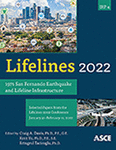An Integrative Framework to Measure the Impacts of Earthquake-Induced Landslides on Transportation Network Mobility and Accessibility
Publication: Lifelines 2022
ABSTRACT
This paper presents an integrative analysis framework combining natural hazards with network mobility to provide insights on disaster preparedness and relief. In particular, this framework characterizes the impact of seismically induced landslides on network mobility to reveal the mobility changes immediately after the events and throughout the course of restoration and recovery efforts. Landslides not only undermine the structural integrity of roadways, but also deposit a significant amount of material on the road surface, usually resulting in partial or complete road closure to traffic. The highly populated Portland, Oregon, Metro is selected as a case study to demonstrate this framework given that the Pacific Northwest is highly prone to large earthquakes as part of the Cascadia Subduction Zone as well as highly susceptible to landslides given its high topographic relief and wet climate. In this case study, travel time to the west and east sides of Willamette River, which divides the Portland Metro area, shows an abrupt change in mobility. In particular, the Portland Hills region with its steep topography is identified as the most vulnerable region. Based on a temporal analysis of recovery, the majority of the network mobility is expected to be restored after 30 days. The results of this study serve as a preliminary assessment of the impact of landslides on network mobility and can facilitate decision making in emergency planning.
Get full access to this article
View all available purchase options and get full access to this chapter.
REFERENCES
Burns, W. J. 2018. Statewide Landslide Information Database for Oregon, Release 3.4: Oregon Department of Geology and Mineral Industries.
Chen, A., C. Yang, S. Kongsomsaksakul, and M. Lee. 2007. Network-based accessibility measures for vulnerability analysis of degradable transportation networks. Networks and Spatial Economics, 7(3), pp.241-256.
Dong, S., A. Mostafizi, H. Wang, and P. Bosa. 2016. Post-Disaster Mobility in Disrupted Transportation Network: Case Study of Portland, Oregon. ASCE International Collaboration in Lifeline Earthquake Engineering IRP 1, pp.501-507.
Faturechi, R., and E. Miller-Hooks. 2014. Measuring the performance of transportation infrastructure systems in disasters: A comprehensive review. Journal of infrastructure systems, 21(1), p.04014025.
Goldfinger, C., C. H. Nelson, A. E. Morey, J. E. Johnson, J. R. Patton, E. Karabanov, J. Gutierrez-Pastor, A. T. Eriksson, E. Gracia, G. Dunhill, and R. J. Enkin. 2012. Turbidite event history: Methods and implications for Holocene paleoseismicity of the Cascadia subduction zone., p.170.
Gupta, U. 2001. Earthquake loss estimation including transportation network damage (Doctoral dissertation, Massachusetts Institute of Technology).
Iverson, R. M., D. L. George, K. Allstadt, M. E. Reid, B. D. Collins, J. W. Vallance, S. P. Schilling, J. W. Godt, C. M. Cannon, C. S. Magirl, and R. L. Baum. 2015. Landslide mobility and hazards: implications of the 2014 Oso disaster. Earth and Planetary Science Letters, 412, pp.197-208.
James, T. S., J. J. Clague, K. Wang, and I. Hutchinson. 2000. Postglacial rebound at the northern Cascadia subduction zone. Quaternary Science Reviews, 19(14-15), pp.1527-1541.
Jenelius, E., T. Petersen, and L.-G. Mattsson. 2006. Importance and exposure in road network vulnerability analysis. Transportation Research Part A: Policy and Practice, 40(7), pp.537-560.
Keefer, D. K. 1999. Earthquake-induced landslides and their effects on alluvial fans. Journal of Sedimentary Research, 69(1).
Keefer, D. K., 2002. Investigating landslides caused by earthquakes–a historical review. Surveys in geophysics, 23(6), pp.473-510.
Leshchinsky, B. A., M. D. Bunn, and M. J. Olsen. 2018. Enhancing Landslide Inventorying, Lidar Hazard Assessment and Asset Management, : Oregon Department of Transportation, Under Review.
Mason, D., P. Brabhaharan, and G. Saul. 2017. Performance of road networks in the 2016 Kaikōura earthquake: observations on ground damage and outage effects. Proc. 20th NZGS Geotechnical Symposium.
O-HELP. 2018. Oregon Hazard Explore for Lifeline Program, Cascadia Lifeline Programs (CLiP), http://ohelp.oregonstate.edu/.
Postance, B., J. Hillier, T. Dijkstra, and N. Dixon. 2017. Extending natural hazard impacts: an assessment of landslide disruptions on a national road transportation network. Environmental Research Letters, 12(1) p.014010.
Sharifi-Mood, M., M. J. Olsen, D. T. Gillins, and R. Mahalingam. 2017. Performance-based, seismically-induced landslide hazard mapping of Western Oregon. Soil Dynamics and Earthquake Engineering, 103, pp.38-54.
Sullivan, J. L., D. C. Novak, L. Aultman-Hall, and D. M. Scott. 2010. Identifying critical road segments and measuring system-wide robustness in transportation networks with isolating links: A link-based capacity-reduction approach. Transportation Research Part A: Policy and Practice, 44(5), pp.323-336.
Sun, Y., M. Turnquist, and L. Nozick. 2006. Estimating freight transportation system capacity, flexibility, and degraded condition performance. Transportati-on Research Record: Journal of the Transportation Research Board, No. 1966, pp.80-87.
Tu, H., J. Van Lint, and H. Van Zuylen. 2007. Impact of traffic flow on travel time variability of freeway corridors. Transportation Research Record: Journal of the Transportation Research Board, No. 1993, pp.59-66.
Information & Authors
Information
Published In
History
Published online: Nov 16, 2022
Authors
Metrics & Citations
Metrics
Citations
Download citation
If you have the appropriate software installed, you can download article citation data to the citation manager of your choice. Simply select your manager software from the list below and click Download.
